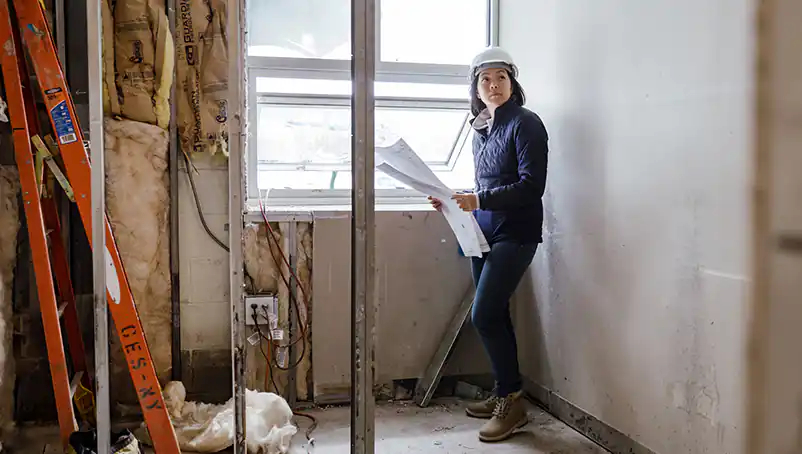Georgia
License required: Yes
General contractors in Georgia must hold a license for projects valued over $2,500, issued by the Georgia State Licensing Board for Residential and General Contractors.
Georgia offers four license types:
- General Contractor (Unlimited)
- General Contractor – Limited Tier (projects up to $500,000)
- Residential Basic Contractor (one- and two-family residences, townhomes)
- Residential Light Commercial Contractor (adds small commercial and multi-family work)
Applicants must meet specific education or experience requirements. You can qualify with a four-year degree in engineering, architecture, building construction or project management; equivalent college coursework and experience totaling at least four years; or four years of construction experience, including at least two working under a licensed general contractor.
Required business insurance in Georgia:
Learn more about Georgia general contractor license and insurance requirements.
Hawaii
License required: Yes
General contractors in Hawaii must be licensed by the Department of Commerce and Consumer Affairs (DCCA), Contractors License Board for any commercial, residential or public works project valued at more than $1,000 or requiring a building permit. Licenses are issued under two main classifications: General Engineering (A) and General Building (B).
Applicants must have four years of supervisory experience within the past ten years, pass both a trade exam and a business and law exam and meet financial and character requirements. A minimum $5,000 surety bond may be required, and all licenses must be renewed biennially.
Required business insurance in Hawaii:
Learn more about Hawaii general contractor license and insurance requirements.
Idaho
License required: Yes (registration, not full licensing)
Idaho requires contractors performing work valued over $2,000 (labor + materials) to register with the Idaho Contractors Board, part of the Division of Occupational & Professional Licenses (DOPL).
To register, applicants must submit business and owner information, proof of general liability insurance or equivalent coverage and either provide workers’ compensation insurance or a statement of exemption.
Required business insurance in Idaho:
Learn more about general contractor license requirements in Idaho.
Illinois
License required: No (statewide)
Illinois does not issue a statewide general contractor license. Licensing is handled by local jurisdictions, such as the City of Chicago Department of Buildings.
In Chicago, a general contractor license is required for most construction, alteration, repair or demolition work. Applicants must submit a statement of financial solvency, proof of general liability insurance and workers’ compensation insurance if they have employees.
You’ll also need to verify your business structure, provide ownership details and pay the corresponding license fee:
- Class A: $2,000
- Class B: $1,000
- Class C: $750
- Class D: $500
- Class E: $300
Required business insurance in Illinois:
Learn more about general contractor license and insurance requirements in Illinois.
Indiana
License required: No (statewide)
Indiana does not require a state general contractor license. Contractor licensing and requirements are handled at the local city or county level, so rules vary depending on where you plan to work.
Contractor applicants usually must register locally, submit proof of general liability insurance and carry workers’ compensation insurance. Some cities, like Indianapolis, also require a surety bond and specific insurance minimums (e.g. $500,000 per occurrence).
Required business insurance in Indiana:
Learn more about Indiana general contractor license and insurance requirements.
Iowa
License required: No (statewide)
Iowa does not require general contractors to hold a trade license, but contractors with $2,000 or more in annual construction work must register with the Iowa Department of Inspections, Appeals & Licensing (DIAL).
To register, you need to provide a valid unemployment insurance account number, submit a $50 registration fee (or a signed fee-exemption form if eligible) and attach proof of workers’ compensation insurance if you have employees.
Out-of-state contractors must also file a $25,000 surety bond as part of registration.
Required business insurance in Iowa:
Kansas
License required: No (statewide)
Kansas does not require a state contractor license. Local governments — cities or counties — may impose contractor licensing or registration requirements depending on where you work. For example, local jurisdictions like Johnson County maintain contractor licensing programs.
Required business insurance in Kansas:
Kentucky
License required: No (statewide)
Kentucky does not mandate a statewide general contractor license; instead, contractor licensing and regulation are handled at the local city or county level. Local jurisdictions may require contractors to register, obtain liability insurance or post a bond before being allowed to bid or permit projects.
Required business insurance in Kentucky:
Learn more about Kentucky general contractor license and insurance requirements.
Louisiana
General contractors in Louisiana must be licensed by the Louisiana State Licensing Board for Contractors (LSLBC). A commercial license is required for projects costing $50,000 or more (or $10,000 for plumbing, electrical, mechanical).
Residential licenses are required for residential construction or home improvements that cost $50,000 or more. Projects between $7,500 and $50,000 require a home improvement registration (unless you already hold a residential or commercial license).
Applicants must designate a qualifying party, submit financial statements, pass trade and business & law exams (if applicable) and maintain good standing with the Secretary of State.
Required business insurance in Louisiana:
Learn more about Louisiana general contractor license and insurance requirements.
Maine
License required: No (statewide)
Maine does not issue a state general contractor license. Contractor registration and permitting are handled locally by cities or counties, so requirements may vary.
State law requires a written contract for any home construction or improvement project valued at more than $3,000. The contract must outline the scope of work, total cost and completion timeline.
Required business insurance in Maine:
Maryland
License required: Yes
In Maryland, general contractors must hold a Maryland Home Improvement Commission (MHIC) license for residential remodeling or repair work. The MHIC operates under the Maryland Department of Labor. Contractors who build new homes must register with the Home Builder Registration Unit through the Office of the Attorney General instead.
Applicants must show two years of experience in home improvement or related construction, pass a business and law exam and provide proof of financial solvency or a bond. Proof of insurance is required at application and renewal.
Commercial general contractors are licensed locally through the Clerk of the Circuit Court in the county where the work is performed.
Required business insurance in Maryland:
Learn more about Maryland general contractor license and insurance requirements.
Massachusetts
License required: Yes
In Massachusetts, contractors performing home improvement work on existing one- to four-unit, owner-occupied residences must register as a Home Improvement Contractor (HIC) with the Office of Consumer Affairs & Business Regulation. For larger structural projects, additions or framing, contractors must also hold a Construction Supervisor License (CSL) issued by the Office of Public Safety & Inspections.
CSL applicants must show three years of experience in construction or design within the past ten years (education may partially substitute) and pass a state licensing exam.
Required business insurance in Massachusetts:
Learn more about Massachusetts general contractor license and insurance requirements.
Michigan
License required: Yes
General contractors in Michigan must hold either a Residential Builder or Maintenance & Alteration (M&A) Contractor license, issued by the Department of Licensing and Regulatory Affairs (LARA). A license is required for any residential or mixed-use project valued at $600 or more.
Applicants must complete a 60-hour prelicensure education course approved by LARA and pass a state exam covering both trade knowledge and business and law. Commercial contractors are regulated locally and should verify licensing and permit requirements with the city or county where they operate.
Required business insurance in Michigan:
Learn more about Michigan general contractor license and insurance requirements.
Minnesota
License required: Yes (for residential work)
Minnesota does not require a state license for general commercial contractors. However, contractors who build, remodel or improve one- to four-family residential dwellings must hold a Residential Building Contractor or Residential Remodeler license through the Department of Labor and Industry (DLI).
Applicants must designate a qualifying person, pass a state exam and provide proof of financial responsibility, including insurance.
Required business insurance in Minnesota:
Learn more about Minnesota general contractor license and insurance requirements.
Mississippi
General contractors in Mississippi must hold a state license from the Mississippi State Board of Contractors (MSBOC) for commercial or residential projects valued at $50,000 or more.
Applicants must pass both a Business and Law exam and a trade exam, submit financial statements and references and provide proof of insurance.
Required business insurance in Mississippi:
Learn more about Mississippi general contractor license and insurance requirements.








